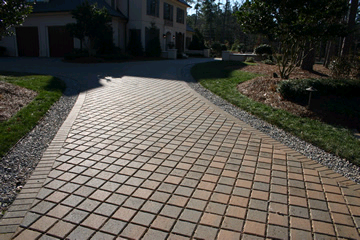.jpg?sfvrsn=ce5e0ebf_2)
Permeable Interlocking Concrete Pavement (PICP) comprises a layer of solid concrete pavers separated by joints filled with small stones. Water enters the joints between the pavers and into an “open-graded” base-crushed stone layer with no small or fine particles. The void spaces among the crushed stone store water and infiltrate it back into the soil subgrade. The stones in the joints provide permeability, and the base filters stormwater and helps reduce pollutants.
Why Use PICP?
Federal, state, and local sustainable site regulations aim to reduce environmental impacts of increased runoff from roofs and pavements. Past practices for controlling stormwater have included detention ponds for collecting runoff and slowly releasing it into a lake, stream, or storm sewer system. More recent  approaches target infiltrating runoff at the site—on a homeowner’s property, for example. PICP for patios, walkways, driveways, and housing development roads infiltrates stormwater, thereby reducing or eliminating detention pond requirements. In some cases, storm sewer pipes and inlets also can be reduced or eliminated. PICP reduces runoff and pollutants, recharges ground-water, and helps reduce downstream erosion and flooding.
approaches target infiltrating runoff at the site—on a homeowner’s property, for example. PICP for patios, walkways, driveways, and housing development roads infiltrates stormwater, thereby reducing or eliminating detention pond requirements. In some cases, storm sewer pipes and inlets also can be reduced or eliminated. PICP reduces runoff and pollutants, recharges ground-water, and helps reduce downstream erosion and flooding.
Appearance
PICP comes in a range of shapes, colors, textures, and patterns to complement any home style and enhance neighborhood character and appeal.
Construction
PICP can be mechanically installed, thereby saving construction time and money. The precast concrete paving units are immediately ready for traffic because there's no waiting for curing.
Cost-effective Reduced Site Impact
Besides lowering drainage costs, PICP is a space saver. Pedestrian and vehicular pavements are combined with detention rather than consuming land as separate areas. The spared land can be used for green space or for homes and buildings.
Durability
PICP is made with high strength, compressed concrete that resists abrasion, freeze-thaw damage, and degradation from deicing salts. PICP has been proven in the coldest climates. It does not heave and remains stable during freeze and thaw cycles.
Longevity
PICP can provide 20 to 25 years of service when carefully constructed and maintained.
Low Impact Development
Many municipalities are turning to low impact development (LID) to reduce environmental impacts and conserve water and air resources. A cornerstone to LID is on-site infiltrating of stormwater. PICP can be a key component for reducing runoff in residential LIDs and in high-density residential and commercial redevelopment.
Snow Removal
PICP can be plowed like any other pavement. Build-up of ice is practically eliminated because the snow melts and drains into the permeable surface and doesn't re-freeze. Slip hazards and potential liability are reduced.
Sustainable Pavement
Increasing energy and materials costs have accelerated conservation through sustainable or“green” design in home construction. A growing number of guidelines for sustainable homes and buildings can assist homeowners, designers, and developers in selecting cost-effective, materials and energy conserving technologies. These guidelines include LEED®, GreenGlobes, and the National Association of Homebuilders National Green Building Standard. All of these recognize the sustainability of permeable pavement for reducing stormwater runoff and pollutants.
.jpg?sfvrsn=b55e0ebf_2)
Besides reducing runoff, permeable pavements can be manufactured with light colored cement and aggregates. Their light colored surfaces reflect radiation, thereby reducing the heat island effect in densely urbanized areas. Most PICP manufacturers use recycled materials from local aggregate and cement sources that reduce environmental impacts from transportation. These materials may enable additional credits toward certified green design.
ICPI offers resources on PICP design, specification, construction, and maintenance through the Permeable Interlocking Concrete Pavements manual. Project owners and designers are encouraged to use ICPI certified contractors experienced with PICP construction. See Interlocking Concrete Pavement Institute.